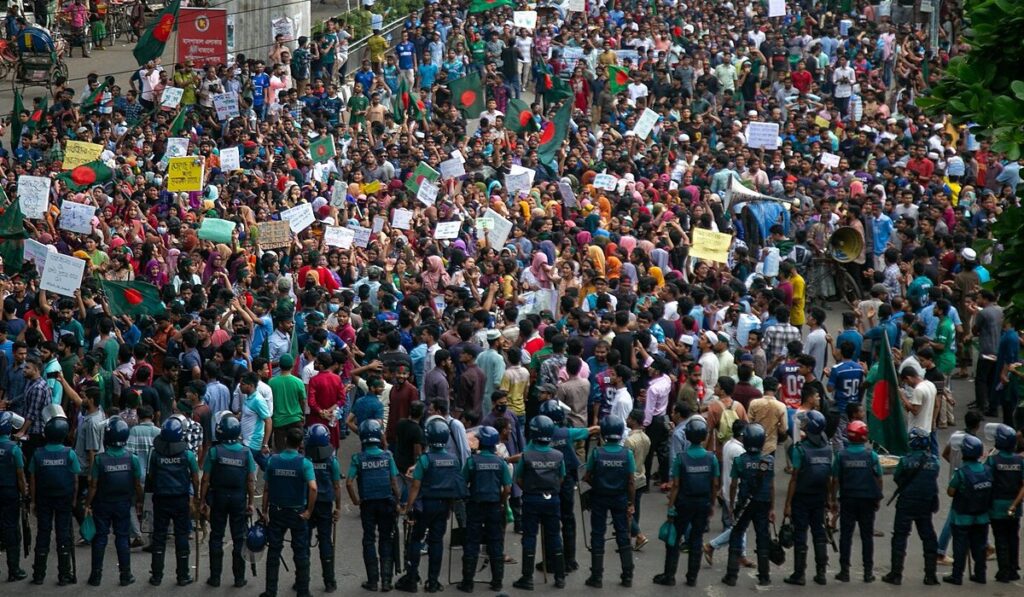A huge student movement against corruption and repression in Bangladesh has exploded into action, with deep roots in the country’s history, reports Zahid Rahman
Student movements have rapidly grown worldwide in response to the ongoing genocide in Gaza, with tens of thousands of students mobilising in support of Palestinians. In Bangladesh, a student-led movement against the discriminatory civil-service job quotas has grown into a mass uprising.
Since 2009, the Awami League government, led by Sheikh Hasina, has utilised every part of the state apparatus, from the police and military to the judiciary, civil service, and electoral authorities, to suppress critics and opposition. Many organisations have highlighted frequent government breaches of human rights. This repression has included harassment of journalists and intellectuals with frequent legal actions, arrests, website takedowns, closing down of newspapers, and even disappearances or killings. The suppression of opposition activities has been particularly harsh, as evidenced by reports of mass arrests of opposition figures and activists, mainly from the Bangladesh Nationalist Party, before the 2024 general elections in January.
The previously peaceful demonstrations against the biassed job quotas in desirable civil-service posts have begun to take the form of confrontations with the police when the government attempted to smash the student-led movement through teargas, rubber bullets and live ammunition in the last week. This shift from peaceful protest to violent confrontation reflects the increasing intensity of the movement.
Government jobs in Bangladesh are highly coveted, especially in a country with an unemployment rate of around 20%. Approximately 30% of these positions are reserved for relatives of the 1971 Liberation War fighters. Many argue that the quota system should be abolished in favour of a merit-based system, as the war was over half a century ago. It is considered that the relatives of freedom fighters are unlikely to be disadvantaged in any way when applying for civil service positions in 2024. It is perceived by critics that the quota system acts as a front for the government to reward loyalists and perpetuate nepotism.
Corruption has plagued Bangladesh for decades as a dreadful legacy carried forward through successive governments of various forms and ideologies. This pervasive corruption is so entrenched that it is often the subject of dark humour among Bangladeshis both at home and abroad. Corrupt practices such as bribery, embezzlement, nepotism and cronyism, extortion, patronage, kickbacks and more have left Bangladeshis demoralised, disillusioned and detached from the political system. This is evident from a record low turnout in this year’s general elections, officially at 40%, but critics note it is likely in reality to have been much, much lower.
Transparency International annually produces a Corruption Perceptions Index (CPI) that scores and ranks states and territories on their corruption. A score of 100 means ‘very clean’ whilst 0 means ‘highly corrupt’; Bangladesh’s score was 24 in the last CPI and ranked 149 out of 180 states and territories for 2023. This issue has agitated Bangladeshis for years and the job quotas are viewed as a part of government nepotism and cronyism.
On Sunday, the Supreme Court of Bangladesh drastically reduced the quotas to 5%, announcing that now 93% of all civil-service jobs would be based on merit, with the remaining 2% reserved for those from ethnic minorities and with disabilities. Given the government’s control of the judiciary, this ruling appears to be the authoritarian regime conceding to public demands while attempting to maintain a perception of a ‘strong government’.
Tradition of student activism
Student activism has played a crucial role in the history of this geographically small country in South Asia. On February 21, 1952, students protested against the imposition of Urdu as the sole national language in what was then East Pakistan. This protest, which led to the deaths of several students when police opened fire, marked the beginning of student involvement in the country’s political struggles. This incident is also commemorated on International Mother Language Day on 21 February.
Students were a crucial part of the independence movement for Bangladesh when it was a part of Pakistan. Operation Searchlight, a military operation carried out by the Pakistani Army that ignited the Bangladesh Liberation War in 1971, made Dhaka University’s students and faculty one of the specific targets in trying to quell the national movement. This led to the butchering of hundreds of academics and students.
In recent decades, Bangladeshi student protests have largely focused on issues of corruption and human rights. While these movements have often struggled to achieve their aims, the scale and intensity of the current demonstrations suggest a significant shift.
The students, nearly unanimous in support of the protests, are yet to back down. The movement has become about more than just job quotas; many in the country, not just the students, are frustrated with the growing inequality, rampant corruption and the slide towards dictatorship with their rights eroding year on year. All signs point to these protests continuing.
The demonstrations seen in the last few weeks and the government’s brutal efforts mark the biggest threat to the Awami League’s rule since 2009. The desperate measures undertaken to curb the uprising such as the deployment of the army, curfews with ‘shoot to kill’ orders and the cutting off of telecommunications and the internet across the nation highlight the remarkable effect these demonstrations are having in the country.
This represents a critical juncture in Bangladesh political landscape. As the government grapples with this unprecedented challenge, the coming months will be crucial in determining whether this uprising will lead to genuine change or if the regime will successfully weather this storm.
Before you go
Counterfire is growing faster than ever before
We need to raise £20,000 as we are having to expand operations. We are moving to a bigger, better central office, upping our print run and distribution, buying a new printer, new computers and employing more staff.

